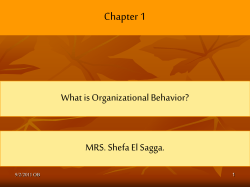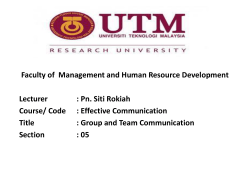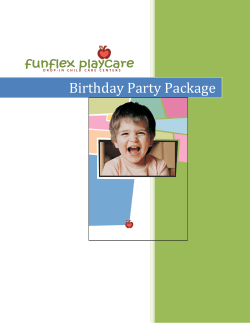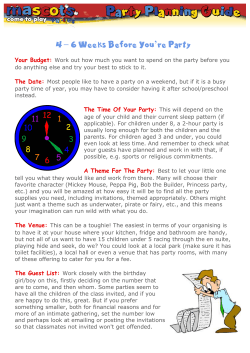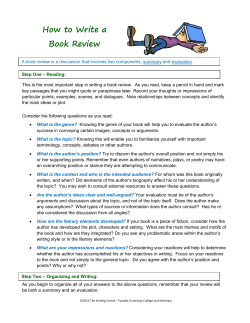
AP French Language and Culture: Sample Syllabus 2 Objectives
AP French Language and Culture: Sample Syllabus 2 Syllabus Number: 876084v1 Objectives This course is designed as a culmination of students’ French studies in high school. At this point, they have already learned the structures necessary to communicate in French. In AP French, students review and refine those grammatical structures while learning new vocabulary to communicate in French on a variety of topics. AP French emphasizes all aspects of language: listening, speaking, reading, writing and culture. This course is designed to prepare students for the AP French Language and Culture examination. AP French Language and Culture is conducted exclusively in French. [CR1] CR1: The teacher uses French almost exclusively in class and encourages students to do likewise. Program Most students in our district begin their study of French in middle school, completing the equivalent of French 1 over three years. They then continue their studies in high school taking French 2, 3 and 4 Honors. AP French Language and Culture is the fifth year of French studies for Honors students. We operate on a block schedule consisting of five 80-minute classes per week for a semester. Materials Student Materials: • R eprise, A Review Workbook for Grammar, Communication and Culture (2nd Edition) Stillman, David M. and Ronnie L. Gordon. Glencoe McHill. • AP French Preparing for the Language Examination (2nd Edition) Richard Ladd and Colette Girard Scott Foresman Addison Wesley 1998 • Candide Voltaire • L’homme qui plantait des arbres Reference materials: • • • • • • • • • • Schaum’s French Vocabulary Mary E. Coffman Crocker McGraw Hill 1998 Connaissances et Réactions Charlotte Cole and Floy Miller Heinle & Heinle 1995 501 French Verbs Christopher Kendris Barron’s 1996 Dans le Vent Catherine A. Maley Holt Rinehart Winston 1999 Ensemble Culture et Société Raymond Comeau, Normand Lamoureux, Marie-Paule Tranvouez Holt Rinehart Winston 1999 Drawing Conversations Véronique Lynch V & B Publications 2005 News broadcast on France 2 (via WYBE) or online at france2.fr Radio France International exercises en français facile (www.rfi.fr/lffr/statistiques/ journauxFrançaisFacile.asp) French newspaper Internet sites Ina.fr Sample Syllabus 2 AP French Language and Culture: Sample Syllabus 2 Organization As this course is equivalent to an intermediate college-level French course, it is conducted in a seminar fashion, whereby the students are expected to participate and help organize the course. In this course, students are introduced to (or review) vocabulary and grammatical structures in context. Every 2-3 weeks, a new theme is introduced. Within that theme, students work on all aspects of communication: listening, speaking, reading and writing. Activities will include the three modes of communication: interpretive, interpersonal and presentational. In lieu of a test for each theme, students are evaluated based on various writing and speaking assignments, which are graded according to the AP guidelines. Daily/weekly activities: • S tudents write between 3-5 separate homework paragraphs or blogs analyzing a specific aspect of a theme. These paragraphs are graded for effort in using various vocabulary and grammar structures. [CR3b] • Students record their answers to a discussion question within a specific theme. • Students read articles from Le Monde, Le Figaro, Les Clés de l’actualité, Phosphore or other periodicals to start a discussion. • Students read passages from AP French Preparing for the Language Examination. • Students participate in daily discussions in French. [CR3a] • Students synthesize and analyze information gleaned from podcasts, songs, film, artwork and photos. [CR4a] • Students synthesize and analyze information gleaned from newspaper and magazine articles and literary texts. [CR4b] • Students practice speaking in pairs using Drawing Conversations questions. • Students take turns starting the class with à la une: a current event. They must present a topic and then ask a discussion question to engage the rest of the class in participation. [CR3a] & [CR9] • Students take a weekly verb quiz. They are assigned three verbs relevant to the current theme. At the end of the week they must conjugate one of the verbs for all the tenses (one subject) and write one sentence using it in context. • Students complete grammar exercises in Reprise. • Students keep a weekly current events journal where they select an article from an online French newspaper site. Students look up unknown words and then summarize and write their reactions based on what they read. CR3b: The course provides opportunities for students to demonstrate their proficiency in written Interpersonal Communication in a variety of situations in the Intermediate to Pre-Advanced range. CR3a: The course provides opportunities for students to demonstrate their proficiency in spoken Interpersonal Communication in a variety of situations in the Intermediate to Pre-Advanced range. CR4a: The course provides opportunities for students to demonstrate their ability in Interpretive Communication to understand and synthesize information from a variety of authentic audio, visual and audio-visual materials. CR4b: The course provides opportunities for students to demonstrate their ability in Interpretive Communication to understand and synthesize information from a variety of authentic written and print resources. CR9: The course prepares students to use the French language in real-life settings. 2 AP French Language and Culture: Sample Syllabus 2 Assessment • W ritten homework assignments, which ask students to expand on a topic discussed in class such as a description of their family, or what is their definition of friendship. • Spoken homework assignments, which ask students to record comments about a topic discussed in class such as a description of their favorite movie or what political issues are the most important to them. • Weekly current events journal where students select an article from an online French newspaper site. Students look up unknown words and then summarize and write their reactions based on what they read. [CR4b] • In-class compositions. Instead of a test, students write composition based on the current theme. For the first quarter they may use any aids (dictionaries, verb books, vocabulary lists, etc.) but they are not allowed to during the second quarter. They are graded using the AP writing guidelines. • At home compositions. Throughout the semester they are asked to write on different topics, such as doing an explication de texte of a poem, an analysis of Candide or an autobiography. They are graded using the AP writing guidelines plus a separate grade for content (like the ones used for the AP French Literature test). [CR5b] • Oral presentations. For each theme, students are given different speaking assignments, such as presenting a speech for a presidential election when talking about politics or their analysis of a painting when studying art. They are graded using the AP speaking guidelines. [CR5a] • Verb quizzes. Students are given 3-6 verbs per theme to study. Every week they take a verb quiz to drill them on the formation of the different tenses. • Grammar quizzes. Particular attention is paid to the subjunctive, the present participle, negative expressions, relative pronouns, si clauses, comparatives/superlatives and prepositions. • Participation. Students are graded daily to encourage them to speak as much as possible in class and to use French exclusively in the classroom. Course Planner Personal and Public Identities Sub Themes: Alienation & Assimilation; Beliefs & Values, Language and Identity, Multiculturalism, Nationalism/Patriotism Overview: We start by brainstorming stereotypes of various cultures and discussing their origins. From there we incorporate the above sub themes into the discussion. Learning Objectives: [CR6d] & [CR7] • S tudents will analyze judgments they have about other nationalities as well as their own. • Students will discuss the role of language (including slang) not just as a means of communication, but as a cultural identity. [CR8] CR4b: The course provides opportunities for students to demonstrate their ability in Interpretive Communication to understand and synthesize information from a variety of authentic written and print resources. CR5b: The course provides opportunities for students to demonstrate their proficiency in written Presentational Communication in the Intermediate to PreAdvanced range. CR5a: The course provides opportunities for students to demonstrate their proficiency in spoken Presentational Communication in the Intermediate to Pre-Advanced range. CR6d: The course explicitly addresses the Personal and Public Identities theme. CR7: The course provides opportunities for students to demonstrate an understanding of the products, practices and perspectives of the target cultures. CR8: The course provides opportunities for students to make comparisons between and within languages and cultures. 3 AP French Language and Culture: Sample Syllabus 2 • S tudents will discuss the role of various ethnic groups and what they contribute to a given society. [CR3a] • Students will discuss the role of cultural identity and compare it to nationalism and patriotism. Sample activities: Vocabulary: »» adjectives of description and nationality »» idiomatic expressions »» French slang »» hobbies/interests/youth activities Grammar: »» Review present tense forms of regular and irregular verbs. »» regular and irregular adjective forms. »» subjunctive Listening: »» film clips from La Haine »» excerpts from RFI en français facile »» excerpts from France 2 Students listen to clips, answer analytical questions based on content. [CR4a] Read: »» Articles from Le Monde, Le Figaro, Les Clés de l’actualité, Phosphore or other periodicals [CR2b] Excerpts from Une Si Longue Lettre [CR2c] Interpersonal Speaking: »» HW recording answering questions such as the difference between nationalism and patriotism. »» Role play: meeting friends at a café using French slang. »» Students interview each other for future presentation. [CR3a] Presentational Speaking: »» Presentation of a classmate for an initial assessment of their speaking. »» Presentation of a specific nationality’s stereotypes, where these ideas come from and what can we do to eliminate them. [CR5a] Interpersonal Writing: »» Blog answers to discussion questions such as where stereotypes come from. »» Students must write an advice letter to a student’s problem, incorporating subjunctive expressions. [CR3b] CR3a: The course provides opportunities for students to demonstrate their proficiency in spoken Interpersonal Communication in a variety of situations in the Intermediate to Pre-Advanced range. CR4a: The course provides opportunities for students to demonstrate their ability in Interpretive Communication to understand and synthesize information from a variety of authentic audio, visual and audio-visual materials. CR2b: Instructional materials include a variety of authentic non-literary texts such as newspaper and magazine articles. CR2c: Instructional materials include a variety of authentic literary texts. CR5a: The course provides opportunities for students to demonstrate their proficiency in spoken Presentational Communication in the Intermediate to Pre-Advanced range. CR3b: The course provides opportunities for students to demonstrate their proficiency in written Interpersonal Communication in a variety of situations in the Intermediate to Pre-Advanced range. 4 AP French Language and Culture: Sample Syllabus 2 Presentational Writing: »» Students write an autobiography to introduce themselves to me and for an initial assessment of their writing. [CR5b] »» in-class essay. Families & Communities Sub Themes: Childhood and Adolescence, Customs and Ceremonies, Family Structures, Friendship and Love Overview: We start with a brainstorming of family vocabulary, which leads to the discussion of what constitutes a family. We extend this discussion to include friendship and love. Learning Objectives: [CR6e] • Students will describe their families and others. • Students will discuss traditional and modern families and what constitutes a family. • Students will discuss how they were raised and what they will do when/if they raise a family. • Students describe and discuss different customs and ceremonies in their cultures and others. [CR7] & [CR8] Sample activities: • Vocabulary : »» family »» holidays and celebrations »» emotions • Grammar: »» Review various tenses/moods: passé composé, imparfait, plus-que-parfait, futur, conditionnel, futur antérieur, conditionnel passé. • Read: »» Articles from Le Monde, Le Figaro, Les Clés de l’actualité, Phosphore or other periodicals. [CR2b] • Listening: »» Watch clips from Un Air en Famille and/or La vie est un long fleuve traquille [CR2a] for vocabulary and discussion. Students need to decipher the meaning from a list of words. • Presentational Speaking: »» HW recording of their families and family traditions. »» Acting as future parents, students discuss how they would raise a family including answers to how they would discipline their child to when/if they would discuss with their child issues related to sex and intimacy. CR5b: The course provides opportunities for students to demonstrate their proficiency in written Presentational Communication in the Intermediate to PreAdvanced range. CR6e: The course explicitly addresses the Families and Communities theme. CR7: The course provides opportunities for students to demonstrate an understanding of the products, practices and perspectives of the target cultures. CR8: The course provides opportunities for students to make comparisons between and within languages and cultures. CR2b: Instructional materials include a variety of authentic non-literary texts such as newspaper and magazine articles. CR2a: Instructional materials include a variety of authentic audio and video recordings. • Interpersonal Speaking: »» Students choose either a role-play of a family dinner or a family appearing on a talk show. At the end I ask pointed questions to students based on their prepared role. »» Students act out a Dating Game scenario, describing their background and interests. 5 AP French Language and Culture: Sample Syllabus 2 • Interpersonal Writing: »» Students blog on a variety of family topics such as the generation gap, curfew, le pacs, etc. [CR3b] »» Students write a letter to a family member in the future about what they have done now that they are 30 years older. »» Students write a letter giving advice to an incoming high school student. • Presentational Writing: »» Description of a personal tradition or childhood memory. »» In-class essay. Contemporary Life Sub Themes: Education, Leisure and Sports, Holidays and Celebrations, Housing and Shelter, Professions, Travel Overview: We cover various aspects of students’ daily lives with the goal of being able to describe their personal lives and contrast them with others in the class and people from different cultures. This theme includes a lesson on the French education system contrasted with the American system. Learning Objectives: [CR6c] • S tudents will describe various aspects of contemporary life including schooling, sports, hobbies, housing, professions and travel. • Students will describe their current situations (i.e. schooling, sports, etc.) and future aspirations (i.e. profession, travel). • Students will compare and contrast different school systems. • Students will evaluate the role of sports in a society. [CR7] Sample Activities: Vocabulary: »» schooling, grade levels »» sports »» hobbies »» housing »» professions »» travel: modes of transport and country names CR3b: The course provides opportunities for students to demonstrate their proficiency in written Interpersonal Communication in a variety of situations in the Intermediate to Pre-Advanced range. CR6c: The course explicitly addresses the Contemporary Life theme. CR7: The course provides opportunities for students to demonstrate an understanding of the products, practices and perspectives of the target cultures. CR2b: Instructional materials include a variety of authentic non-literary texts such as newspaper and magazine articles. CR2c: Instructional materials include a variety of authentic literary texts. Grammar: »» relative pronouns »» expressions with avoir, faire and être, »» participe présent Reading: »» Articles from Le Monde, Le Figaro, Les Clés de l’actualité, Phosphore or other periodicals »» Job ads and CVs [CR2b] »» Le Mythe de Sisyphe [CR2c] 6 AP French Language and Culture: Sample Syllabus 2 Listening: »» film clip from Être et avoir and Entre les Murs »» interview of athlete, for example Zinedine Zidane on Canal+ online »» podcasts detailing specific professions [CR2a] CR2a: Instructional materials include a variety of authentic audio and video recordings. Interpersonal Speaking: »» HW recording of past travel experiences and if they have been prejudiced against in their travels. »» Students act out job interviews. Presentational Speaking: »» Students choose from three discussion questions analyzing their education or education in general and report to the class. The rest of the class is responsible for answering discussion questions the speaker created. »» Present research about a francophone country. »» Present research about a sport played in France or francophone country. Interpersonal Writing: »» Students write postcards from places they have “virtually” visited. »» A cover letter for a job application. »» Blog on topics such as future careers or the 35 hour work week. Presentational Writing: »» Students describe a sports competition to “appear” in a French newspaper. »» Students will create a brochure attracting people to come to a francophone country. Global Challenges Sub Themes: Economic Issues; Environmental Issues; Health Issues; Human Rights, Peace and War Overview: We start with brainstorming current political issues and discussing their importance. This theme includes a lesson on the French political and health systems contrasted with the American systems. Learning Objectives: [CR6a] • Students will describe the French and American governmental systems. • Students will debate current events and controversial issues. • Students will describe their own health and others including life-threatening health issues and how it’s viewed by different countries. [CR7] Sample Activities: Vocabulary: »» government »» political issues »» health issues »» environmental issues CR6a: The course explicitly addresses the Global Challenges theme. CR7: The course provides opportunities for students to demonstrate an understanding of the products, practices and perspectives of the target cultures. Grammar: »» conditionnel »» si clauses 7 AP French Language and Culture: Sample Syllabus 2 Reading: »» Articles from Le Monde, Le Figaro, Les Clés de l’actualité, Phosphore or other periodicals [CR2b] »» L’Homme qui plantait des arbres [CR2c] Listening: »» documentary from dailymotion.com of Mai 68 demonstrations »» online debates of political candidates when available »» France 2 news [CR2a] »» RFI en français facile »» Short film: L’Homme qui plantait des arbres Presentational Speaking: »» Present research to class on a French political party »» Present research previously conducted or on-going involving health issues (e.g. skin grafts, AIDS research, stem cell research) »» class election – students present themselves as candidates for “president” in which they list the most important issues to them and what their solutions might be CR2b: Instructional materials include a variety of authentic non-literary texts such as newspaper and magazine articles. CR2c: Instructional materials include a variety of authentic literary texts. CR2a: Instructional materials include a variety of authentic audio and video recordings. Interpersonal Speaking: »» Perform a debate on issues such as gun control; the use of nuclear energy or socialized health care. [CR9] Interpersonal Writing: »» Students blog on topics such as if it is appropriate to judge the personal life of a candidate or if they have confidence in the president »» Review of a given technology/discovery written as “commentary” on a blog CR9: The course prepares students to use the French language in real-life settings. Presentational Writing: »» Description for a given technology/discovery Science & Technology Sub Themes: Ethical Questions; Future Technologies; the New Media; Social Impact of Technology Overview: We start with a questionnaire on students’ interest and awareness of technology. This theme includes a lesson on French discoveries of which they may be unaware. Then we delve into some of the ethical issues that surround new technologies. Learning Objectives: [CR6b] • Students will describe various discoveries or breakthroughs of French scientists • Students will discuss the impact of various social media on a society CR6b: The course explicitly addresses the Science and Technology theme. Sample Activities: Vocabulary: »» Various technologies »» Media »» Texting/email language Grammar: »» prepositions (à, de, other) 8 AP French Language and Culture: Sample Syllabus 2 Reading: »» Articles from Le Monde, Le Figaro, Les Clés de l’actualité, Phosphore or other periodicals [CR2b] Listening : »» News reports from France 2 and RFI [CR2a] Interpersonal Speaking: »» Students write responses to editorials in French newspaper »» Students describe photos of actual inventions »» Students will debate controversial topics such as stem cell research or nuclear energy • Presentational Speaking: »» Students present a French discovery /breakthrough such as the newest airplanes, facial skin grafts, HIV discovery »» Students present a new “discovery” they created to deal with a current problem • Interpersonal Writing: »» Students set up mock Twitter site with status updates about what they are doing and comments from other classmates [CR3b] • Presentational Writing: »» Students write a review of a recent discovery. Beauty & Aesthetics CR2b: Instructional materials include a variety of authentic non-literary texts such as newspaper and magazine articles. CR2a: Instructional materials include a variety of authentic audio and video recordings. CR3b: The course provides opportunities for students to demonstrate their proficiency in written Interpersonal Communication in a variety of situations in the Intermediate to Pre-Advanced range. Sub Themes: Architecture; Ideals of Beauty; Literature; Music; Performing Arts; Visual Arts Overview: This theme includes a lesson on some of the most famous artists, musicians, films, cuisine, literature in French and francophone culture. CR6f: The course explicitly addresses the Beauty and Aesthetics theme. Learning Objectives: [CR6f] • Students will describe various art products (film, painting, books) and their preferences. • Students will cite various well-known French (and francophone) artists, musicians, actors, etc. • Students will discuss what art is and the role of art in a society. [CR7] Sample Activities: Vocabulary: »» fine art, poetry, music »» music »» literature terms; descriptions »» film genres, descriptions of movies »» theatre terms »» food and restaurants Grammar: »» passive voice and ways to avoid it [CR8] »» comparatives and superlatives CR7: The course provides opportunities for students to demonstrate an understanding of the products, practices and perspectives of the target cultures. CR8: The course provides opportunities for students to make comparisons between and within languages and cultures. 9 AP French Language and Culture: Sample Syllabus 2 Reading: »» French poetry Labé, LaFontaine, Baudelaire, Rimbaud, Appolinaire [CR2c] »» Roland Barthes’ philosophy of French cuisine »» Film reviews [CR2b] Listening: »» students perform close listening exercises of contemporary French music (MC Solaar, Louise Attaque, Indochine, Carla Bruni, etc.) »» various film clips: Les Choristes, Les 400 coups, Cyrano de Bergrac, Amélie; »» Watching Les 400 Coups without subtitles. Students analyze the movie as they would a piece of literature. They complete several cloze exercises. »» interview with François Truffaut describing his movies »» Watching previews of recent and up-coming French movies [CR2a] Interpersonal Speaking: »» Students act out scenes from films with input from class »» Students debate aspects of art such as violence in movies, censorship of art, etc. [CR9] Presentational Speaking: »» present research to class on a French composer and artist »» HW recording on their art preferences »» students select a French painting of excerpt of music and analyze it for the class »» students present a French recipe as if they were on a food show explaining how to cook it, where it is from (which region), why they chose it and how it is served [CR7] »» students present a virtual tour of a French museum highlighting favorite works of art »» Interpersonal Writing: »» Students blog about the role of art in their lives and the role of art in a society [CR9] Presentational Writing: »» students write their own fable à la LaFontaine »» explication de texte of a poem of their choice »» film review of a French movie CR2c: Instructional materials include a variety of authentic literary texts. CR2b: Instructional materials include a variety of authentic non-literary texts such as newspaper and magazine articles. CR2a: Instructional materials include a variety of authentic audio and video recordings. CR9: The course prepares students to use the French language in real-life settings. CR7: The course provides opportunities for students to demonstrate an understanding of the products, practices and perspectives of the target cultures. CANDIDE by Voltaire [CR2c] • Vocabulary: »» Students are given a vocabulary and discussion question packet which they must complete for each chapter • Presentational Speaking: »» in groups students report on the major events of the novel in a news broadcast format »» students assume a role from the book and explain their character’s progression throughout the book • Interpersonal Speaking: »» role plays • Presentational Writing: at home essay graded on content and language 10 AP French Language and Culture: Sample Syllabus 2 FINAL PROJECTS (Presentational & Interpersonal Speaking/Presentational Writing) Students select a topic. They may choose to delve into one we already discussed or one we never studied. They research this topic and each student gives a presentation on his topic of no less than 15 minutes. They are asked to make the presentation interactive by including discussion questions, visual aids, quizzes, games, etc. I then create an individual writing prompt for the student. This is their final exam for the class. It asks them to demonstrate control over a variety of vocabulary terms and structures in both spoken and written form. Their grade is based on their speaking ability, writing ability and the content of the presentation. Past topics have included a survey of the Nouvelle Vague Films, an explanation of the demonstrations of Mai 68, a background of the HIV discovery, and a history of French pastry. 11
© Copyright 2025


